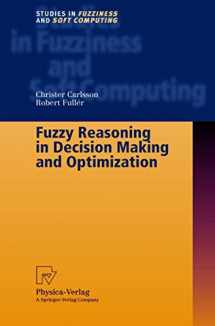
Fuzzy Reasoning in Decision Making and Optimization (Studies in Fuzziness and Soft Computing, 82)
ISBN-13:
9783790814286
ISBN-10:
3790814288
Edition:
2002
Author:
Robert Fuller, Christer Carlsson
Publication date:
2001
Publisher:
Physica
Format:
Hardcover
351 pages
FREE US shipping
Book details
ISBN-13:
9783790814286
ISBN-10:
3790814288
Edition:
2002
Author:
Robert Fuller, Christer Carlsson
Publication date:
2001
Publisher:
Physica
Format:
Hardcover
351 pages
Summary
Fuzzy Reasoning in Decision Making and Optimization (Studies in Fuzziness and Soft Computing, 82) (ISBN-13: 9783790814286 and ISBN-10: 3790814288), written by authors
Robert Fuller, Christer Carlsson, was published by Physica in 2001.
With an overall rating of 3.9 stars, it's a notable title among other
books. You can easily purchase or rent Fuzzy Reasoning in Decision Making and Optimization (Studies in Fuzziness and Soft Computing, 82) (Hardcover) from BooksRun,
along with many other new and used
books
and textbooks.
And, if you're looking to sell your copy, our current buyback offer is $0.3.
Description
Many decision-making tasks are too complex to be understood quantitatively, however, humans succeed by using knowledge that is imprecise rather than precise. Fuzzy logic resembles human reasoning in its use of imprecise informa tion to generate decisions. Unlike classical logic which requires a deep under standing of a system, exact equations, and precise numeric values, fuzzy logic incorporates an alternative way of thinking, which allows modeling complex systems using a higher level of abstraction originating from our knowledge and experience. Fuzzy logic allows expressing this knowledge with subjective concepts such as very big and a long time which are mapped into exact numeric ranges. Since knowledge can be expressed in a more natural by using fuzzy sets, many decision (and engineering) problems can be greatly simplified. Fuzzy logic provides an inference morphology that enables approximate human reasoning capabilities to be applied to knowledge-based systems. The theory of fuzzy logic provides a mathematical strength to capture the un certainties associated with human cognitive processes, such as thinking and reasoning. The conventional approaches to knowledge representation lack the means for representating the meaning of fuzzy concepts. As a consequence, the approaches based on first order logic do not provide an appropriate con ceptual framework for dealing with the representation of commonsense knowl edge, since such knowledge is by its nature both lexically imprecise and non categorical.


We would LOVE it if you could help us and other readers by reviewing the book
Book review

Congratulations! We have received your book review.
{user}
{createdAt}
by {truncated_author}


